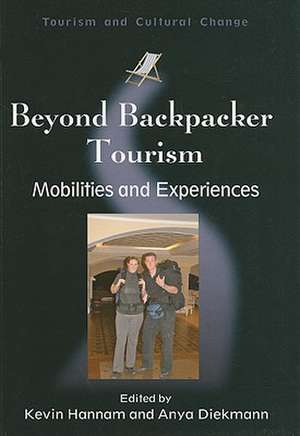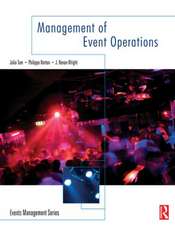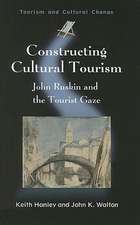Beyond Backpacker Tourism: Tourism and Cultural Change, cartea 21
en Limba Engleză Paperback – 31 ian 2010
Building on previous work on backpacking, this book takes the analysis of backpacker tourism further by engaging both with new theoretical debates into tourism experiences and mobilities as well as with new empirical phenomena such as the rise of the flashpacker and alternative destinations. Chapters include material on flashpacking, the virtualization of backpacker culture, the re-conceptualisation of lifestyle travellers, backpackers as volunteer tourists, as well as backpackers' experiences of hostels, mobilities and their policy implications. It sets a new benchmark for the study of independent travel in the contemporary world.
Din seria Tourism and Cultural Change
-
 Preț: 312.12 lei
Preț: 312.12 lei -
 Preț: 191.05 lei
Preț: 191.05 lei -
 Preț: 273.12 lei
Preț: 273.12 lei -
 Preț: 228.99 lei
Preț: 228.99 lei -
 Preț: 273.08 lei
Preț: 273.08 lei - 18%
 Preț: 688.75 lei
Preț: 688.75 lei - 18%
 Preț: 688.83 lei
Preț: 688.83 lei - 23%
 Preț: 776.32 lei
Preț: 776.32 lei -
 Preț: 298.70 lei
Preț: 298.70 lei -
 Preț: 294.68 lei
Preț: 294.68 lei -
 Preț: 296.42 lei
Preț: 296.42 lei - 23%
 Preț: 776.50 lei
Preț: 776.50 lei -
 Preț: 295.45 lei
Preț: 295.45 lei -
 Preț: 293.78 lei
Preț: 293.78 lei -
 Preț: 294.46 lei
Preț: 294.46 lei -
 Preț: 290.82 lei
Preț: 290.82 lei -
 Preț: 291.57 lei
Preț: 291.57 lei -
 Preț: 297.36 lei
Preț: 297.36 lei -
 Preț: 296.42 lei
Preț: 296.42 lei -
 Preț: 370.42 lei
Preț: 370.42 lei -
 Preț: 260.41 lei
Preț: 260.41 lei -
 Preț: 297.74 lei
Preț: 297.74 lei - 23%
 Preț: 887.08 lei
Preț: 887.08 lei - 23%
 Preț: 721.01 lei
Preț: 721.01 lei -
 Preț: 290.23 lei
Preț: 290.23 lei - 23%
 Preț: 717.33 lei
Preț: 717.33 lei -
 Preț: 262.32 lei
Preț: 262.32 lei -
 Preț: 296.42 lei
Preț: 296.42 lei -
 Preț: 295.45 lei
Preț: 295.45 lei -
 Preț: 256.55 lei
Preț: 256.55 lei -
 Preț: 255.57 lei
Preț: 255.57 lei -
 Preț: 293.54 lei
Preț: 293.54 lei -
 Preț: 295.83 lei
Preț: 295.83 lei -
 Preț: 296.42 lei
Preț: 296.42 lei -
 Preț: 255.57 lei
Preț: 255.57 lei -
 Preț: 257.51 lei
Preț: 257.51 lei -
 Preț: 288.70 lei
Preț: 288.70 lei -
 Preț: 292.55 lei
Preț: 292.55 lei -
 Preț: 256.55 lei
Preț: 256.55 lei - 23%
 Preț: 717.16 lei
Preț: 717.16 lei -
 Preț: 251.75 lei
Preț: 251.75 lei
Preț: 294.46 lei
Nou
Puncte Express: 442
Preț estimativ în valută:
56.35€ • 58.98$ • 46.90£
56.35€ • 58.98$ • 46.90£
Carte tipărită la comandă
Livrare economică 31 martie-14 aprilie
Preluare comenzi: 021 569.72.76
Specificații
ISBN-13: 9781845411305
ISBN-10: 1845411307
Pagini: 241
Ilustrații: black & white tables
Dimensiuni: 147 x 208 x 15 mm
Greutate: 0.34 kg
Editura: Channel View Publications Ltd
Seria Tourism and Cultural Change
ISBN-10: 1845411307
Pagini: 241
Ilustrații: black & white tables
Dimensiuni: 147 x 208 x 15 mm
Greutate: 0.34 kg
Editura: Channel View Publications Ltd
Seria Tourism and Cultural Change
Notă biografică
Kevin Hannam is Chair of the ATLAS Backpacker Research Group (BRG). He is currently Professor of Tourism Development at the University of Sunderland, UK. He has published widely on tourism theory and is co-author of the text Understanding Tourism and co-editor of the journal Mobilities.; Anya Diekmann is coordinator of ATLAS Europe. She is Assistant Professor at the IGEAT and co-director of LIToTeS (Laboratoire interdisciplinaire Tourisme, Territoire et Societes), Universite Libre de Bruxelles, Belgium. Her publications include work on social tourism and aspects of cultural tourism with a particular focus on heritage and ethnic tourism.
Cuprins
1.From Backpacking to Flashpacking: Developments in backpacker tourism research - Kevin Hannam and Anya Diekmann 2.Not such a rough or lonely planet? Backpacker tourism: an academic journey - Mark P. Hampton 3.Flashpacking in Fiji: Reframing the 'global nomad' in a developing destination - Jeff Jarvis and Victoria Peel 4.The Virtualization of Backpacker Culture: Virtual Mooring, Sustained Interactions, and Enhanced Mobilities - Cody Paris 5.Re-Conceptualising Lifestyle Travellers: Contemporary 'drifters' - Scott Cohen 6.Backpacker Hostels: Place and Performance - Michael O'Regan 7.Euro-railing: A Mobile-Ethnography of Backpacker Train Travel - James Johnson 8.Budget Backpackers Testing Comfort Zones in Mongolia - Claudia Bell 9.Lesbian Identities Backpacker Travel Experiences in New Zealand - Linda Myers 10.Backpackers as Volunteer Tourists: Evidence from Tanzania - Kath Laythorpe 11.Backpackers in Norway: Landscapes, ties and platforms - Gareth Butler 12.Town of 1770, Australia - The Creation of a new Backpacker Brand - Peter Welk 13.A Clash of Cultures or Definitions? Complexity and backpacker tourism in residential communities - Robyn Bushell and Kay Anderson 14.Towards Strategic Planning for an Emerging Backpacker Tourism Destination: The South African Experience - Christian Rogerson
Recenzii
This excellent edited collection by international scholars clearly demonstrates the ongoing research agenda of backpacking. It offers a critical contribution by engaging with the changing dynamics of backpacking and examines a range of complex issues. A delightful find in this book is that, not only are the mainstream destinations discussed but lesser known areas (such as: Mongolia, Tanzania and Norway) are evident and add to the book's richness.Angela Benson, University of Brighton, UKBeyond Backpacker Tourism provides a useful overview of the current state of backpacking and of the kind of research being undertaken on the subject.Frances Brown, Seabank, Maidens, Scotland, UK in Tourism Recreation Research Vol. 36, No. 1, 2011Beyond Backpacker Tourism is the newest edited volume to be produced by the Backpacker Research Group (BRG) of the Association for Tourism and Leisure Education. It follows Backpacker Tourism (Hannam & Ateljevic, 2008) and The Global Nomad (Richards & Wilson, 2004). While the editors stress they did not attempt to provide an "exhaustive account of backpacker tourism research" (p. 1), they nevertheless succeed in presenting a thorough picture of developments within backpacker research that is as enlightening as the two previous offerings.Benjamin Lucca Iaquinto, Monash University, Australia in Annals of Tourism Research 38 (2011) 723-743, 2011













